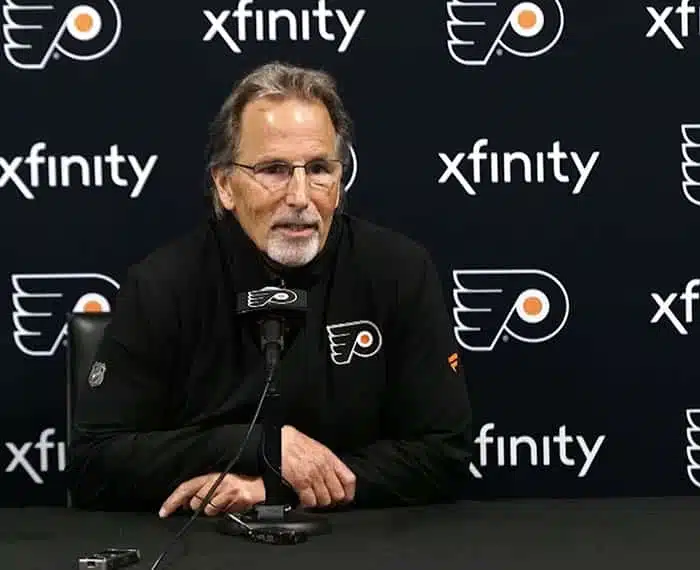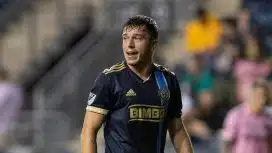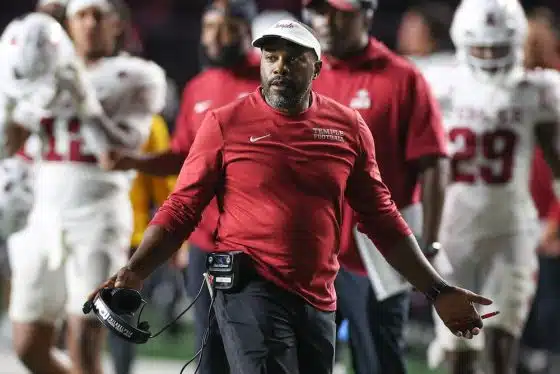Flyers
Tortorella on Accountability: ‘We’ve Got Some Work to Do’

Friday’s exit interviews was all about the players, but with so much question about what the Flyers roster will look like in a matter of months, the real focus was on the people in charge speaking on Monday.
Head coach John Tortorella was first to the podium on Monday afternoon and expressed a satisfaction in growth from younger players.
“I thought we had some really good progress with our kids. A lot of them were put into some heavy minutes, some key situations,” Tortorella said. “Saw a couple come up at the end of the year, [Tyson] Foerster, a couple of defensemen. So in a year where I’m sure everybody around us, an atrocious year as far as this, that, the record, not making the playoffs. I don’t look at it that way. The way I have to or the way we have to, Danny and I and the organization, is the step that we are in of the process, and that was going to be losing some games. No one likes doing it, but that’s part of it. That’s the part we’re in right now.”
While that may have been the positive side of the season, there was certainly a learning curve for Tortorella in his first year behind the bench and first year in the organization, getting to know more about players he admittedly didn’t know much about upon taking the job. Tortorella expressed that his main goal this season was establishing a standard for how you go about business, and while the team played hard, a key part of that standard is accountability. Tortorella had some interesting thoughts on that subject.
“Holding people accountable, you find out about people. I have found out about people, as far as people that simply don’t know what the word means. And I’m talking about players,” Tortorella said. “Some players just don’t want to be held accountable or just can’t handle it. That’s building a standard.
“The accountability factor as far as what’s expected, as far as play, as far as being a pro, conduct, practice habits, teammate being a teammate, playing under a team concept, we’ve got some work to do. Not with all of them, but with a number of our players, and I expected that. We’re gonna keep banging away on it.
“I think when there’s accountability with a player or something doesn’t go right and a player’s benched or isn’t happy, you guys think it’s the end of the world. It’s part of the process of building accountability. Yeah, I’ll leave it at that. I’m not trying to be vague, but we have work to do. I think we have work to define that and understand what the definition of accountability is.”
Tortorella further elaborated on the process of building a standard of accountability, and how it eventually should be something that the coach doesn’t need to act upon at all.
“A coach’s job is to hold the player accountable when he doesn’t think the player is holding himself accountable,” Tortorella said. “A coach’s job is to hold the team accountable when he doesn’t think the team is holding themselves accountable. That’s a huge part of our job. Bench coaching is very important, putting men on the right spot and all that. In this situation here and the process we’re in right now, that’s one that we’re going to have to get better.
“You can play hard, and we did. To play under a team concept, to play and be a good pro, understand, at least here, you’re gonna have to accept the honesty and understand that that’s all it is, honesty. It’s not a personal thing. We have a ways to go there. I think we’re way too goddamn sensitive out here and about that, about simply coaching.”
Tortorella’s explanation for this and the possibility of a “clash in personalities” between his style and what a player is most receptive to can differ. Tortorella explained that he doesn’t coach players 1-on-1, more so in a group setting, so that what is being called out about one player is being called out among the group.
“You all hear about it because I think it’s that important. I used to do the 1-on-1’s with players, and I think it goes in one ear and out the other. I think when it’s in a classroom setting, you’ve got the inner pressure. It becomes an inner pressure in the locker room. Eventually, you want the locker room to take over itself, so we don’t have to be in there,” Tortorella said. So to get back to that, it is a group setting and it’s total honesty. Does that cause a clash? Sure, it does. It’s so unfair to the player if I’m not totally honest because I don’t think I’m doing my job. I think I’m doing the player a disservice if I’m not totally honest.”
In the offseason ahead, there will be plenty of questions about the future status of players. Tortorella was not giving names, but did talk a little more specifically about Tony DeAngelo after his benching for the final five games of the season and how there are things that he will try to work out with DeAngelo behind the scenes.
Otherwise, the focus has shifted to the rebuild, the focus on not straying from a process that is certainly underway. Between new chairman and governor Dan Hilferty, interim GM Danny Briere, and the rest of the organization, it seems that sense of direction finally exists.
“I’m looking forward to it because I think the biggest thing in the philosophy of what we’re doing is we’re gonna stay with it. I think the biggest point out of this is when you commit to a process of what we have to do to try to get this right, you can’t go looking when there’s that guy out there that has a fairly big name and you change course. We can’t change course. We’ve got to stay the course and let our kids develop,” Tortorella said.
“I hope we’re younger next year and keep developing our kids. There’s going to be a time when that bigger name is out there. I think we’re all in agreement with that. I think that’s the most important point here is that everybody believes in how we have to do this. That’s not saying you don’t go out and get some players, some free agents, because there are some out there that can fill some spots for us kind of in backfilling as I’ve said, not looking for the top ones.”
With the process underway, the job for Tortorella has become less about learning about players and taking the information he has to chart the course forward. That involves having players that believe in the process, understanding that there are no quick fixes and that the road to further success is going to be demanding.
“I want believers. I do. I don’t think you find your way unless you have believers and I think you go through a process, especially this is our first year as a coaching staff. I’m sure it’s different for a lot of them,” Tortorella said. “Do they believe? I think we can tell with their actions as we’ve gone through a long year.
“The non-believers that don’t want to be here? I’m sure that goes to Danny. I don’t want non-believers. I just think it’s a really tough piece of ground to start on and try to stabilize this organization. There are a lot of players out there. If one guy doesn’t want to be here, again, it’s like I’ve always said, it’s not like football, you just moved him out of here. It may take time.
“I’m not saying to you guys that I have all the answers, but I’m going to coach this team the way I think is fit. I’m going to coach this team in the way I think this team needs to be coached. I’m not going to shy away from that, maybe because some feelings are hurt or you think there’s mayhem in the room.”












































